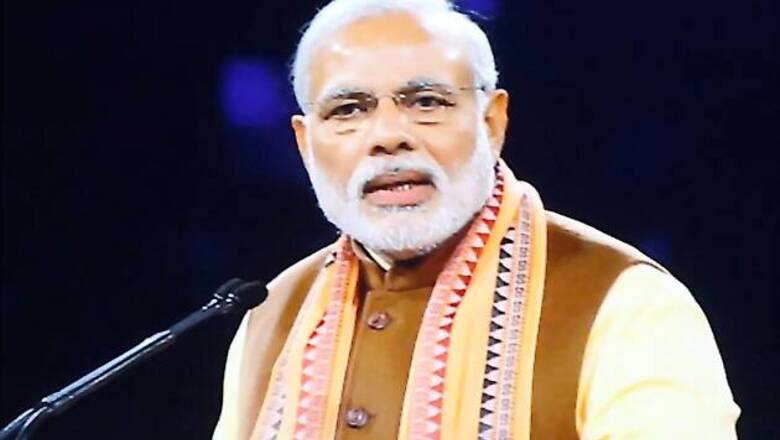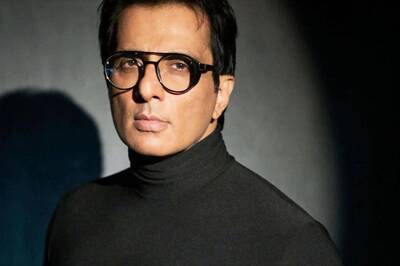
views
The meteoric rise of Narendra Modi to the position of Prime Minister is a landmark event in many ways. Pundits and experts may have different views on the overall fallout of historic change. But one fact is undeniable: the other India has spoken.
By 'other India' I mean the non-English India. Consider the previous prime ministers of the largest democracy of the world. the longest ruling of them had English education and spoke with an Oxbridge accent. This is true of Jawaharlal Nehru and his daughter who ruled longest as prime ministers.
Rajiv Gandhi's style fell into the same pattern. Lal Bahadur Shastry, Morarji Desai, VP Singh, Chandrashekhar and IK Gujral, though not of Nehruvian mould, were all comfortable and communicative in English. Modi's immediate predecessor, Manmohan Singh, in spite of his not very English accent, seemed to be surrounded by the halo of a suave, soft-spoken and vilayat-trained Professor.
Atal Bihari Vajapeyee was different. Though his accent was irredeemably Hinglish, he brought into his English speeches the persuasive force of his flowery Hindi rhetoric perfected over years.
To some extent, one can say that Modi's predecessors were Chaudhary Charan Singh and HD Deve Gowda. The more snobbish of media pundits and privileged public - bhadralok - grumbled in whispers that this amounted to the coming of Barbarians.
'How can they represent India abroad given the fact that they cannot speak English?' they wondered, underlining the unconscious conviction of enlightened Indians that to be educated is equal to be gifted with 'good English'
I remember the cruel joke that made rounds when Deve Gowda became the Prime Minister. it goes somewhat like this: The Third Front leaders had gathered in Bihar Bhavan to decide who should be the next Prime Minister. None of the north Indian stalwarts like Lalu and Mulayam were willing to wear the mantle given the precariousness of the situation. At last Lalu said in despair: 'Kisi ghode ko banaa do'. Deva Gowda misheard the word 'ghoda' and got ready to lay claim to the throne.
This piece of political fantasy mischievously created, circulated and enjoyed suggests a deep contempt for 'un-eduated'(non-English) India.
I have reasons to believe that this contempt and prejudice is so deep in our unconsciousness that even the propagandists for native culture fall prey to it.
I remember how a nativist intellectual of Karnataka - I prefer not to name him - bemoaned with trembling voice: "Look what has happened. Our democracy has plummeted so much that even an uneducated can be the PM." However, late UR Ananthamurthy, who was also there, contradicted this snobbery. He said: "That precisely is the beauty of democracy. Anyone can now become the PM."
That any one-not just English-friendly lot can rise to the topmost position in India was vindicated by Deve Gowda. This triumph of democracy was short lived. Moreover, Deve Gowda's choice as PM was more a happy accident than collective choice of the electorate as in Modi's case.
Modi's landslide win was nothing short of a wonder. In a country that is becoming increasingly Americanised in every walk of life where younger generations whether in politics, cinema, business and sports make their mark by being English-savvy, a non-English-savvy leader gets one of the biggest mandates ever to rule the land.
A few months after storming his way to the top with his highly rhetorical and performative Hindi- lo and behold - the same leader is heard making a fulminating speech in English during his recent Germany visit.
Can we now conclude that non-English India has at last prevailed over English India?
Apparently, yes but the situation is a lot more complex than it seems.
There was a host of other national level non-English leaders like Lalu and Mulayam but they could not match Modi's magic or glory in the eyes of the electorate. Modi magic may have others reasons than just his non-English image.
His performative skills no doubt mattered. But all his grandiloquent words and gestures were pressed into the service of another 'language' of globalisation and development which is different from the seemingly outdated language of welfare distributive justice articulated by his opponents.
His RSS-background notwithstanding, Modi was speaking like a prophet ushering in the golden age of e-governance and free WiFi. Hindutva rhetoric played no role in his big win. The fact that Modi could communicate this new age dream on Bollywood scale in Hindi - the most widely spoken language of India - made him a symbol of India come of age in 21st century.
A similar if not identical use of common man's language worked a miracle in case of Arvind Kejriwal's phenomenal victory in Delhi polls. Though not given to Modi kind of high-flown rhetoric, he too spoke of development and ubiquitous WiFi in the common man's low mimetic tongue different from Modi's high mimetic. The up shop was another huge win.
After the falling of curtain on the last scene of election drama, after the main players take off their special costumes, the demands of everyday reality has begun to dare then in the eyes. What is now required is not development talk but delivery on the ground.
What has gone wrong with Modi's critics? They do not appear to have developed an alternative language to move masses. The problem with their critique is that it is founded on the premises of pre-development era of social welfare. Being a Keynsian response to conventional capitalism and its rival communism, it became outdated in the post-perestroika world. So did the orthodox communist ideology stemming from outdated realities.
The question is not if Modi and Kejriwal will deliver. The question is this: even if they do, will the world be a better place?
Modi's critic need to develop a new language different from those of orthodox communism and liberalism to counter the much bandied about force and fascination of development and globalisation.
In short, it is the failure of opposition to develop a convincing new language and narrative.





















Comments
0 comment